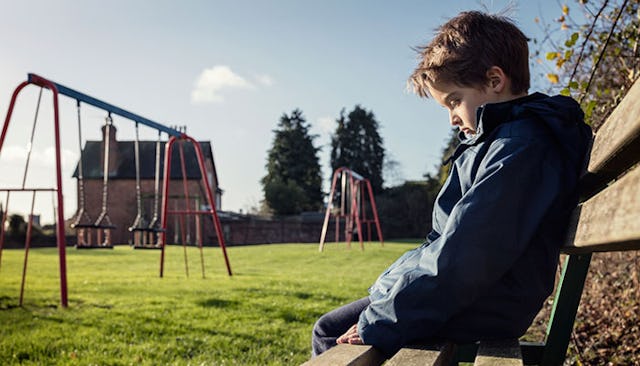To the Man Who Called Him A Retard: His Name Is Landon

Earlier this week, a friend of mine expressed outrage over a comment posted on her friend Courtney’s Facebook page. I stared at the words of the forwarded screenshot:
“Hey, sorry ur kid is retarded, but God works in great ways. 🙂 Enjoy.”
My heart plummeted. I immediately flashed back to the first time I heard this word. A little boy named Ricky stood alone under the monkey bars. He was surrounded by a group of boys who were pelting him with pebbles and throwing dirt on him. The chant “Retard, Retard” echoed across the playground.
I was 6 years old at the time, so I didn’t really understand the situation. I went home, chanting with delight, “Retard, Retard. Ricky is a retard.” My normally sweet, gentle mother turned on me with anger. “What did you just say?” she barked at me.
I didn’t understand her scowl. “Retard. There was a retard on the playground,” I explained.
“Don’t use that word. It’s a very mean word,” she said, bending down to my eye level. I cringed under her direct gaze. “He’s a person with a name. It’s Ricky.”
My mother’s voice echoed in my head as I pictured Courtney’s beautiful little boy in the same situation. His dirty blond hair covered in filth and his crystal blue eyes streaming with tears as a group of kids torments him for being different. Is this his future?
Courtney’s little boy has a name. His name is Landon and he is 5 years old. He has autism, but he’s more than his diagnosis. Landon loves Minecraft and is an epic Lego builder. Landon is brilliant with numbers and has the makings of a future engineer. Landon asks his mother what’s wrong when she’s sad and comforts her by telling her that he loves her.
Landon. His name is Landon.
People who use the R-word may tout the “free speech” argument. They may ask, “What’s the big deal? It’s just a word. Retard. Don’t be sensitive. It was a joke.”
There was nothing funny about the little boy on the playground—standing alone in the center of a ring of spectators like a caged animal at the circus, mocked, humiliated, alone. No one should be treated like this, no one, especially not a small child and most definitely not by an adult who should know better.
I don’t want see Landon or any other child suffer for being different. I didn’t help Ricky back then, but I can do something about it now. All of us can. We can choose our words with care. And we can stop being bystanders.
There is a website called “R-Word: Spread the Word to End the Word.” Its mission is to eliminate the use of the R-word for several reasons:
– The R-word ISOLATES people with cognitive differences. It implies that they are not fit to associate with the rest of the population due to their differences. Obviously, this is absurd.
– The R-word DEHUMANIZES people with cognitive disabilities. It is easier to bully someone who doesn’t even have the dignity of a name. Cruelty thrives on anonymity.
– The R-word HURTS people with cognitive differences. It implies that anyone with an intellectual or developmental disability is stupid and has nothing to offer to the world, which is beyond ridiculous. So why even use it?
Visitors to the R-word site have the option to make the following pledge:
“I pledge and support the elimination of the derogatory use of the R-word from everyday speech and promote the acceptance and inclusion of people with intellectual disabilities.”
My choice is clear. I choose Landon and Ricky. I made this pledge the day I finished writing this piece. What is your choice?
March 2 is the Spread the Word to End the Word day of awareness. Visit www.r-word.org to pledge to stop saying the R-word.
This article was originally published on